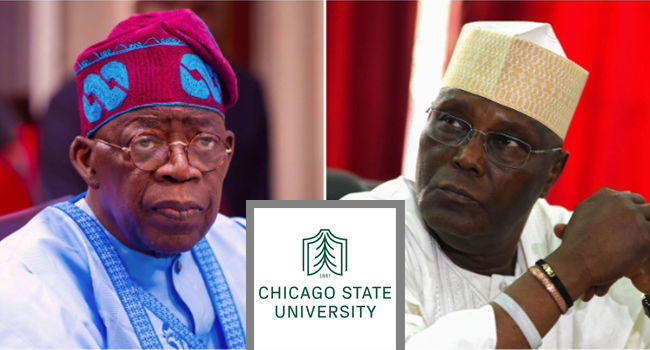Atiku Abubakar, the Peoples Democratic Party’s nominee for president in the election on February 25, has pleaded with the Supreme Court to grant him permission to present new evidence to support his claim that President Bola Tinubu falsified the paperwork he gave to the Independent National Electoral Commission.
He asserted that any candidate submitting false documents is a serious constitutional violation that ought to be discouraged.
This was said in Atiku’s response to Tinubu’s legal argument against the leave in response to his objection. He wanted to provide the top court with new proof.
Read Also: Police Officer To Face Disciplinary Actions For Shooting At Ladipo Market
“Presenting forged documents by any candidate, especially by a candidate for the highest office in the land, is a very grave constitutional issue that must not be encouraged,” he said.
Tinubu had urged the Supreme Court to dismiss the application, describing it as a crass abuse of court processes.
But in his response on the point of law, Atiku urged the court to jettison technicality and grant his application.
He argued that the issue of merit ought not to be determined or pronounced upon at the interlocutory stage.
To refuse to grant the leave, as the respondents have argued, will amount to undue technicality.
“The Supreme Court, as the Apex Court and indeed the Policy Court, has intervened time and again to do substantial justice in such matters of great constitutional importance, as it did in the case of AMAECHI vs. INEC (2008) 5 NWLR (Pt. 1080) 227 and OBI vs. INEC (2007) 11 NWLR (Pt. 1046) 565. The Supreme Court applied the principle of ubi jus ibi remedium to ensure substantial justice is done in such novel scenarios.
“The need to rebuff, eschew, and reject technicality and the duty of Court to ensure substantial justice is very germane in this matter, given the gravity of the constitutional issue involved in deciding whether a candidate for the highest office in the land, the office of President of the Country, presented a forged certificate or not.
“Law is blind. It has no eyes. It cannot see. That explains why a statue of a woman with her eyes covered can be found in front of some High Courts. On the contrary, justice is not blind. It has many eyes, it sees and sees very well.
‘The aim of Courts is to do substantial justice between the parties and any technicality that rears its ugly head to defeat the cause of justice will be rebuffed by the Court,” Atiku stated.

